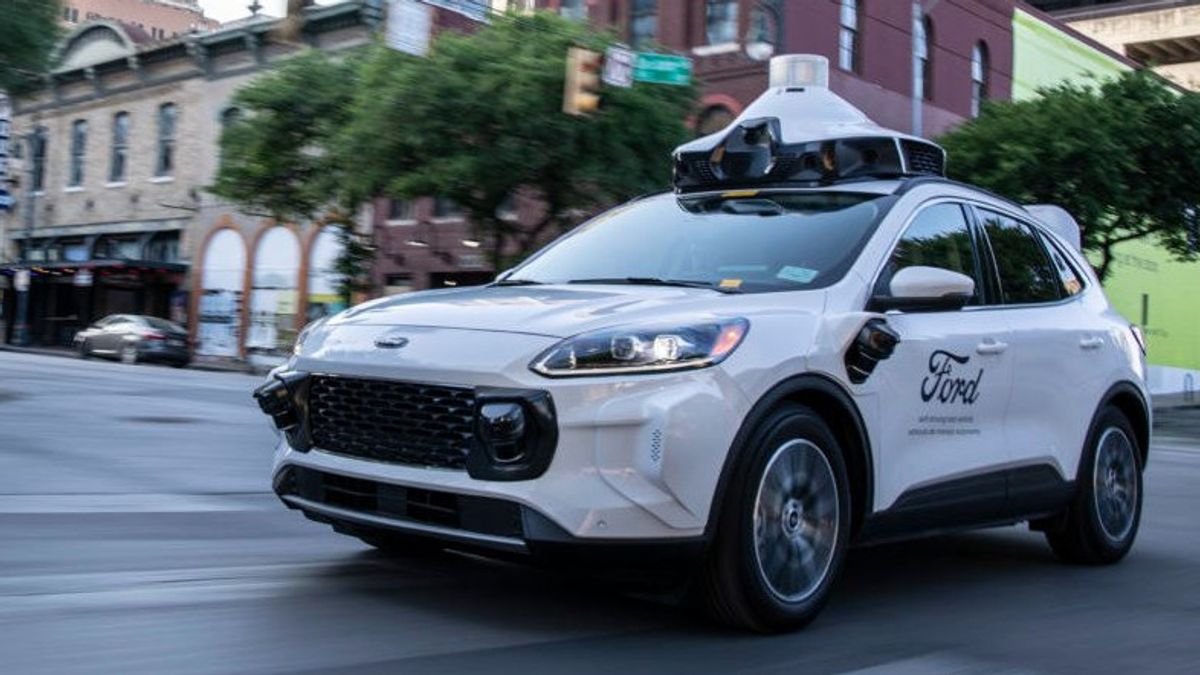JAKARTA - Automakers and technology companies are currently facing bumpy roads to clean regulatory barriers to deploy autonomous vehicles (AVs) without human control on public roads.
On Wednesday, October 26, Ford Motor Co and Volkswagen AG said they would close Argo AI self-driving startups, saying the technology was still far away. The same goes for the rules surrounding technology.
Legislations in Congress have also stalled for more than five years on how to change regulations to include self-driving cars, including the scope of consumer and legal protection.
US regulators also gave no indication of when they would act on a petition to approve several thousand self-driving cars on US roads without steering wheels or brake pedals. US National Highway Traffic Safety Administration (NHTSA) officials on Thursday, October 27 declined to say when they would act.
US Transport Secretary Pete Buttigieg said this month he had "a very high hope for the theoretical possibility that self-driving cars and high-tech cars would save thousands and thousands of lives as humans basically have a deadly track record as car drivers." But we haven't arrived yet," Buttigieg said, quoted by Reuters.
Some in the industry and in Washington also see the development of self-driving vehicle technology as a competitive problem.
Many lawmakers and industry have urged Buttigieg to develop a comprehensive federal framework for autonomous vehicles, warning the United States could lose the AV race to China.
"We are lagging behind in forming a regulatory framework that will encourage this innovation while protecting and encouraging all the important benefits we believe can be provided by autonomous vehicles," wrote a dozen US Democratic senators in April.
The letter cites the efforts of competitors, particularly China, who "have invested significantly in autonomous and connected vehicle technology."
This problem has become a new urgency due to traffic deaths in the US having soared since the start of the COVID-19 pandemic. Even last year jumped 10.5% to 42,915. That marks the highest number of Americans killed in the year since 2005.
Supporters of self-driving projects, said autonomous vehicles have the potential to reduce traffic deaths, expand mobility access for people with disabilities, reduce parking needs in dense cities and reduce greenhouse gas emissions.
In July, NHTSA, part of the US Department of Transport, opened a petition for comments filed by General Motors and Ford asking regulatory agencies to provide exceptions to deploy up to 2,500 self-driving vehicles without human control such as steering wheels and brake pedals every year per manufacturer. No automaker has asked for approval to sell self-driving vehicles to consumers.
GM wants to use Origin, a vehicle with doors such as subways and without steering wheels. GM said the vehicle would ask passengers to put on seat belts before starting their autonomous journey.
But the Detroit automaker faced resistance. Following a petition from GM and a June crash involving autonomous, City and Regency vehicles San Francisco said in its comments GM and Cruise failed to provide adequate data and failed to document or analyze safety performance in autonomous vehicle driving.
Cruise said "the great majority of public comments made on Cruise Origin are positive, underscoring the sustainability benefits and accessibility of vehicles and support for American work."
In 2017, the US House of Representatives passed legislation to accelerate the adoption of self-driving cars and banned setting performance standards, but the bill never escaped the US Senate.
"We are working hard to find a common ground to get something we can get through," Michigan Democratic Representative
Prospects in the new Congress that begin in January are very uncertain and the law faces tough resistance from unions and groups representing plaintiff lawyers.
While the law has not been passed, NHTSA has in recent months stepped up oversight of advanced driver assistance systems and autonomous vehicle systems. Last year the agency directed all automakers and technology companies to immediately report accidents involving self-driving vehicles.
The English, Chinese, Japanese, Arabic, and French versions are automatically generated by the AI. So there may still be inaccuracies in translating, please always see Indonesian as our main language. (system supported by DigitalSiber.id)









